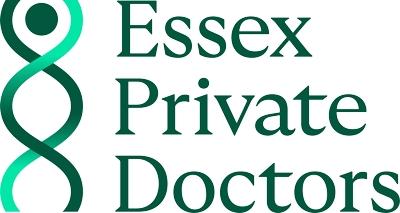Have you been feeling ‘a bit off’ lately? Maybe your energy isn’t what it used to be, or you’re finding it harder to stay in shape? At Essex Private Doctors, we often see men struggling with these issues, and the culprit might surprise you – it could be low testosterone.
What is testosterone?
Testosterone is a vital steroid hormone in the androgen family. In men, it’s primarily produced in the testicles, with small amounts from the adrenal glands. Women’s ovaries also produce testosterone, but in much smaller quantities. It’s part of a hormonal feedback loop, regulated by a complex system involving the hypothalamus and pituitary gland.
Testosterone isn’t just about sex and libido – it’s crucial for muscle growth, bone density, fat distribution, red blood cell production and even certain brain functions. Most testosterone in your bloodstream is bound to proteins, with only about 2% circulating as ‘free’ testosterone. It’s this free form that’s biologically active, directly influencing your body and mind.
As we age, our testosterone production naturally starts to slow down. For most men, this decline becomes noticeable between 40 and 50. Some call it “male menopause,” but this probably isn’t a helpful term, because the testosterone decline happens slowly, and not every man experiences symptoms as they age.
Symptoms of low testosterone
Low testosterone can affect your body and mind in various ways:
- Mood and Mental Well-being: Low testosterone levels may lead to mood swings, irritability, and potentially exacerbate conditions such as depression. Cognitive functioning, including memory and concentration, may also be affected.
- Physical Manifestations: Reduced muscle mass and strength are common, along with an increase in body fat, particularly around the abdomen or chest (aka beer belly, and ‘man boobs’). This can impact your exercise capacity and overall physical performance.
- Sleep Disturbances: Many men with low testosterone report changes in sleep patterns, such as insomnia, which can contribute to persistent fatigue and diminished well-being. Night sweats are also common with low testosterone.
- Type 2 diabetes: Research suggests that testosterone deficiency can complicate the management of diabetes by influencing lipid regulation and insulin sensitivity. It can be far harder to reverse type 2 diabetes if the person also has low testosterone.
Concerned your testosterone might be low? The good news is that diagnosing it is straightforward. A simple blood test can give us the answers we need. As part of a hormonal work up, we may recommend checking:
– Total testosterone levels
– Sex hormone-binding globulin (SHBG) – which enables us to calculate ‘free’ testosterone
– Luteinising hormone (LH) and follicle-stimulating hormone (FSH)
We may also look at your prostate-specific antigen (PSA) levels, especially if you’re over 50.
Boosting Your Testosterone: Options Tailored for You
We have several effective treatment options for men whose symptoms are caused by low testosterone, including:
Testosterone Replacement Therapy (TRT):
– Gels or creams applied to your skin
– Injections (usually every 1-3 weeks)
– Long-acting pellets inserted under the skin
Lifestyle Modifications:
– Targeted exercise programs
– Nutrition plans to support hormone balance
– Stress management techniques
Why Address Your Testosterone Levels?
Optimising your testosterone can lead to some impressive benefits:
– Improved mood and mental clarity
– Increased muscle mass and reduced body fat
– Better sleep quality
– Enhanced libido and sexual function
– Potential improvements in diabetes management
Let’s clear up a common misconception – addressing low testosterone isn’t about chasing eternal youth or solving a midlife crisis. It’s about helping you feel your best and reducing your risk of certain health conditions. There’s no one-size-fits-all approach to testosterone management. We’ll work with you to find the right solution for your unique needs and lifestyle.
If you’re experiencing any of the symptoms we’ve discussed, or you’re simply curious about your hormone health, we’re here to help.
Contact us today to schedule your appointment.






